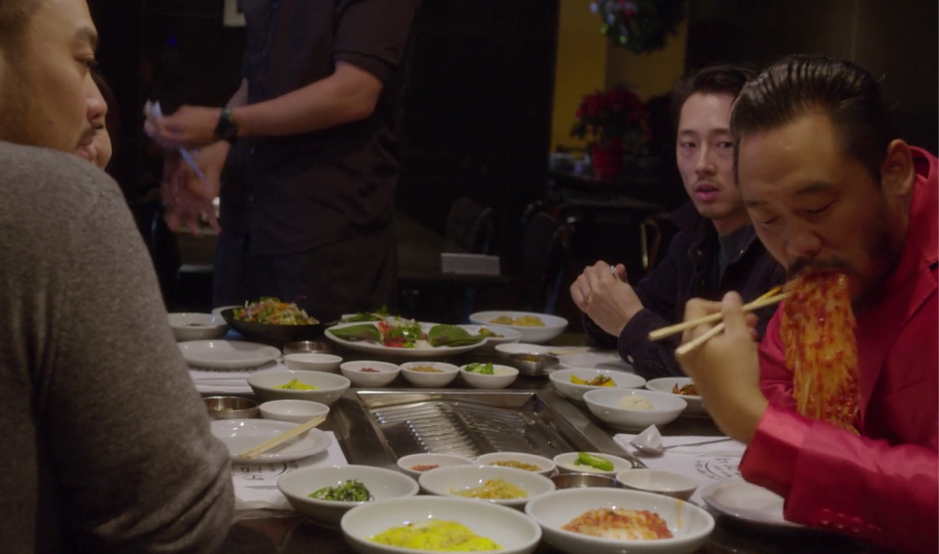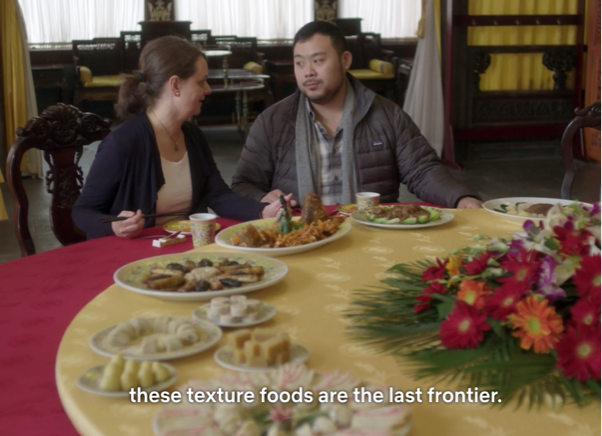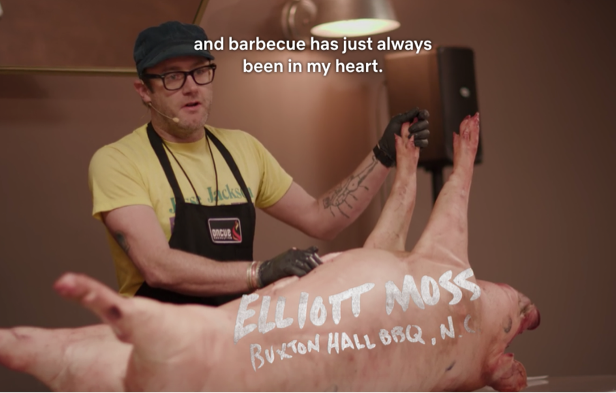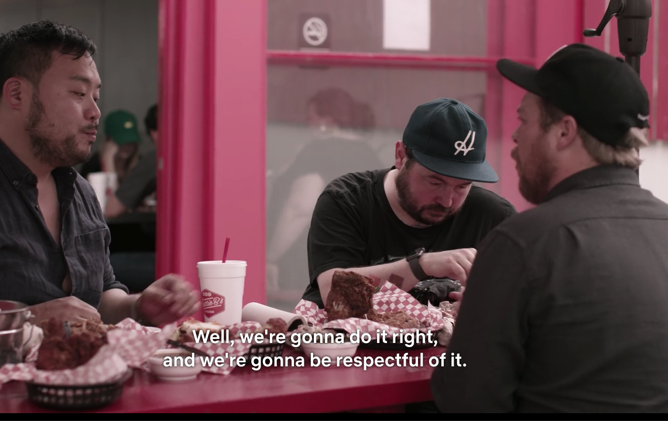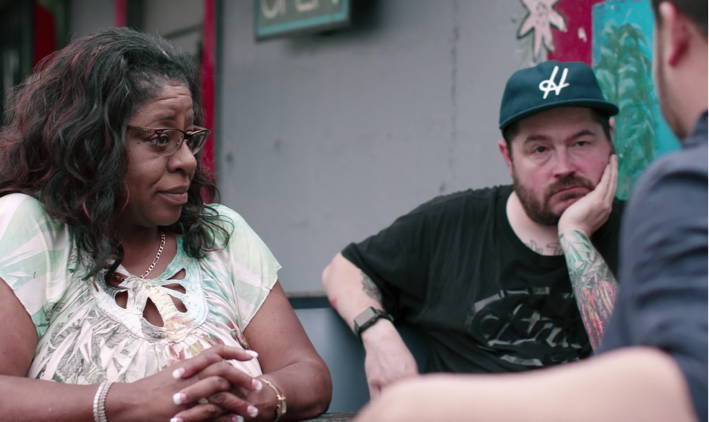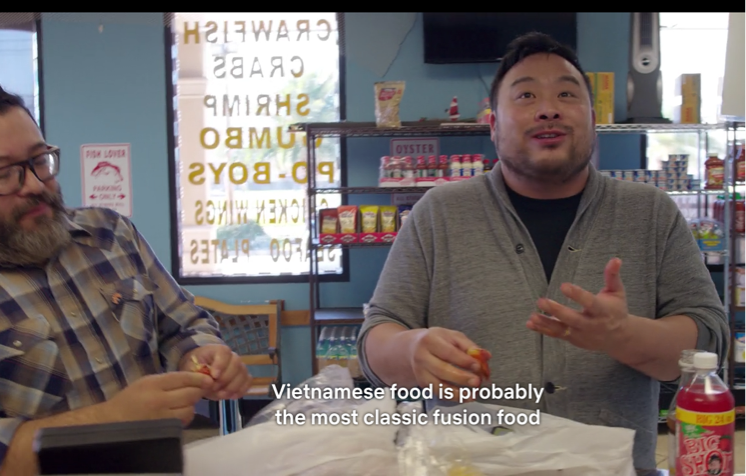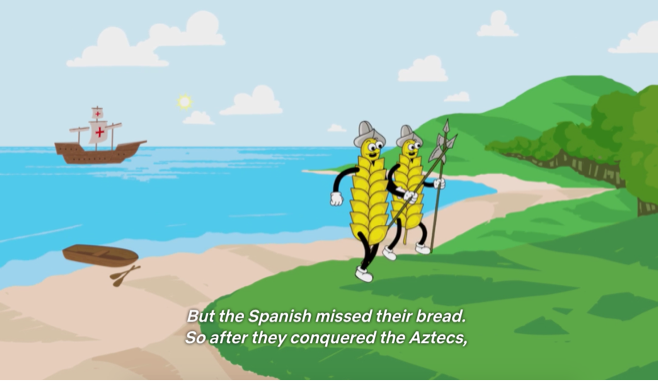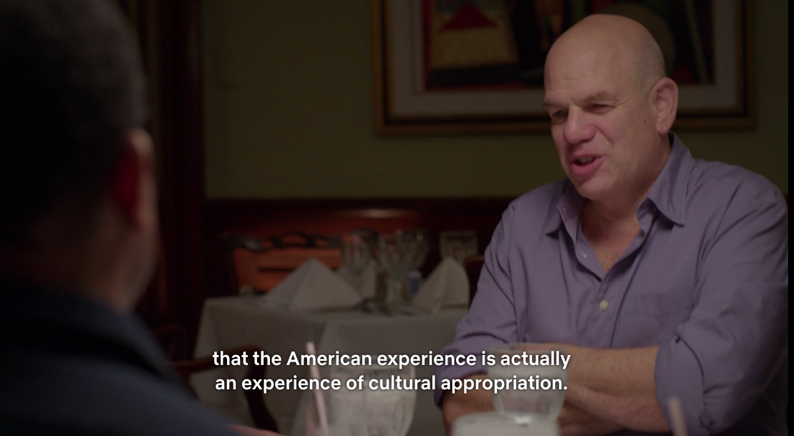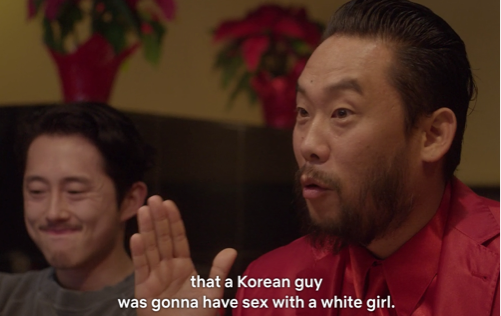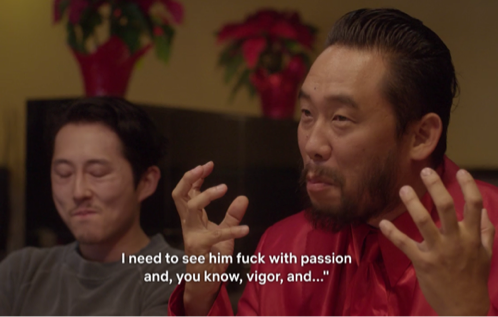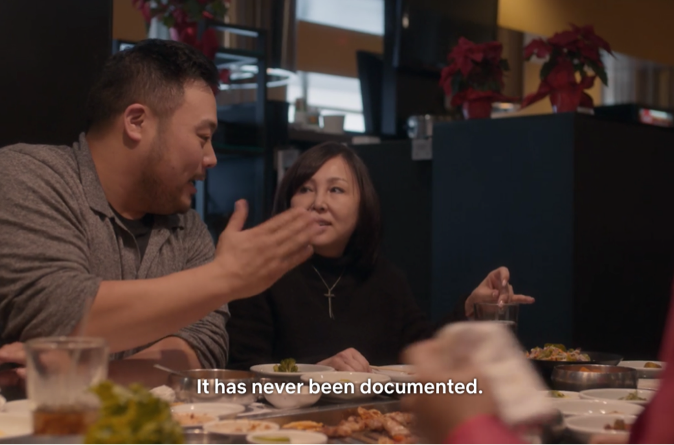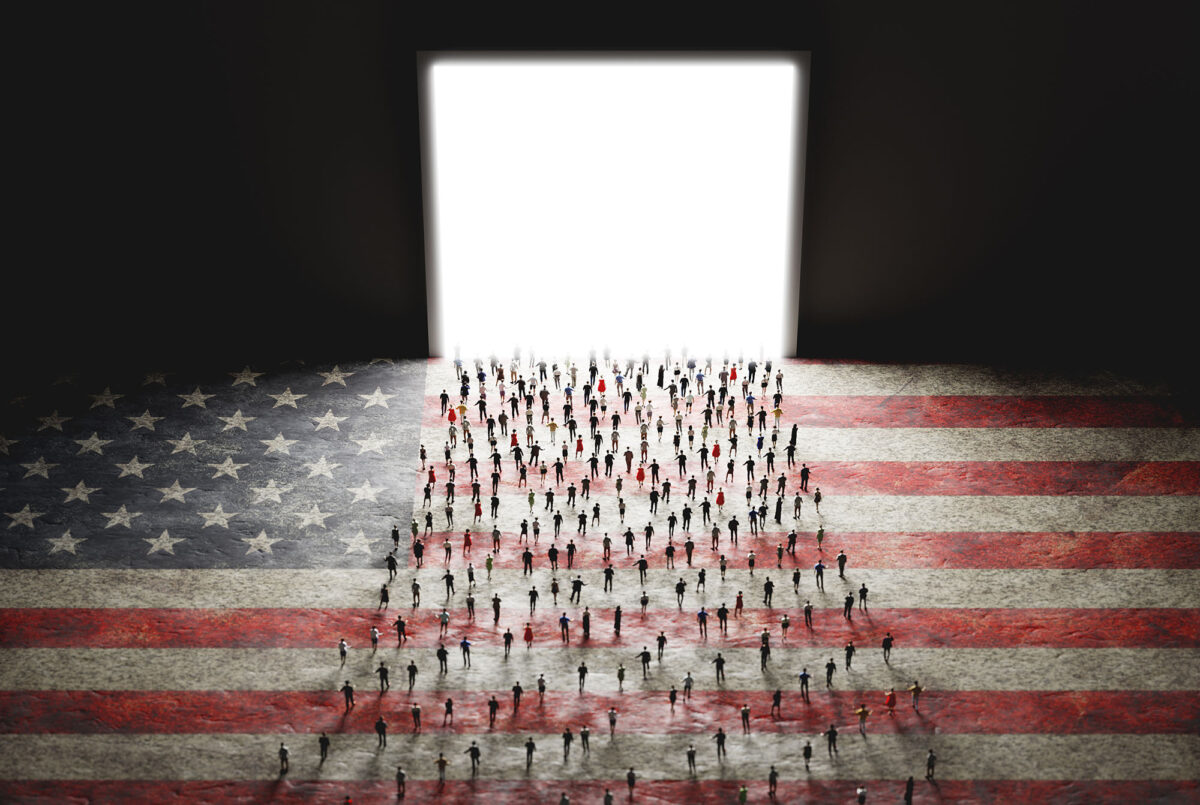By Guest Contributor: Rachel Kuo
The popular reception of David Chang’s Netflix series Ugly Delicious – which seeks to open conversations about food, culture, identity, and politics – demands investigation into how the show actually engages these questions. Beyond troubling concepts like ‘authenticity’, what does Ugly Delicious offer and where might it fall short?
Ugly Delicious has received positive reviews from popular food sites like Eater, while publications like the New Yorker, New York Times, the Boston Globe, Vulture, and Indiewire specifically laud the show’s ability to tackle the cultural politics of food and engage difficult questions about race, class, and power in food culture. Chang himself states that the show uses food as a ‘Trojan Horse’ to talk about broader social topics as well as to represent histories and tell cultural stories about food.
Through Ugly Delicious, Chang is able to talk about the “elephant in the room: racism” (Episode 7: Fried Rice). By leveraging his elite status in the culinary world, his success in building restaurants that ‘mix’ and ‘borrow’ from different cuisines, and his ability to expertly navigate his Korean American identity, Chang is able to engage in debates about culinary appropriation in mainstream media where other people of color who have written bout food and race have been met with criticism, backlash, anger, and trolling.
Ugly Delicious offers introductory conversations around the racial and cultural politics of food. For example, in ‘Fried Rice‘, ‘Tacos‘, and ‘Fried Chicken‘ episodes, the show establishes that in order to talk about food, taste, and authenticity, one must engage the ways in which structural racism decides whose food gets valued and why. What do we do with food when white supremacists want their Del Taco while seeking to deport Mexican immigrants, too? Chang contends with his conflicted emotions about the popularization of Korean food, evoking Ruth Tam’s writing on the frustration of being shamed for one’s food when white people make it trendy.
Despite provoking these nuanced ideas around race and food, Ugly Delicious also reproduces harmful cultural logics and narratives, such as the overemphasis on representational visibility as viable markers for social progress; the exacerbation of problematic racial dynamics around white self-identified cultural experts; and, the erasure of colonialism, militarism, and war when stating that certain food cultures have ‘always’ had global influence.
Given that the show intends to open up conversations about social issues through food, my hope is that it can spark further discussions about the intersections of food, race, power, and capital.
Below are five moments and elements from that show that we should engage further:
1. A White Pantheon of Culinary Experts: On Race and Authority
The episode ‘Fried Rice’ centers around Chinese food and how it’s devalued in U.S. food culture. While it features several Chinese food writers and restauranteurs, such as Serena Dai (Eater), Jennifer 8. Lee (journalist), Joe Ng (Red Egg), Brandon Jew (Mister Jiu’s) and Wendy Lam (New China Palace), many of the other ‘culinary experts’ featured are white. This list includes Fuchsia Dunlop (listed as a Chinese food expert), Ruth Reichl (New York Times restaurant critic), Ed Schoenfeld (restaurant consultant, co-owner Red Egg), Chris Nuttall-Smith (food critic), Gary Selesner (President of Caesars Palace), and Gillian Ferguson (food writer).
Yes, Ugly Delicious aims to destabilize and reject purity in food culture by reconsidering the politics of who gets to cook what food. However, it remains silent over the uneven racial dynamics of expertise and who gets to be the authorial voice in producing knowledge around food and culture.
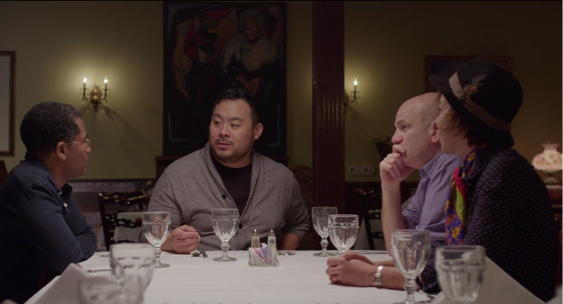 Culinary experts like Fuchsia Dunlop, who is hailed as someone who “make new discoveries about cuisines”, are portrayed as the objective authority over Chinese food; yet Ugly Delicious offers no commentary on the problematic racial, Orientalist, and colonial dynamics of presenting non-Asian critics as experts of Asian cuisine. Also, all of the episodes feature Chang around a table (or in the case of the ‘Taco’ episode, cruising around town for a meal), and Chang’s dinner ‘crew’ always includes at least one white person who serves as an industry expert.
Culinary experts like Fuchsia Dunlop, who is hailed as someone who “make new discoveries about cuisines”, are portrayed as the objective authority over Chinese food; yet Ugly Delicious offers no commentary on the problematic racial, Orientalist, and colonial dynamics of presenting non-Asian critics as experts of Asian cuisine. Also, all of the episodes feature Chang around a table (or in the case of the ‘Taco’ episode, cruising around town for a meal), and Chang’s dinner ‘crew’ always includes at least one white person who serves as an industry expert.
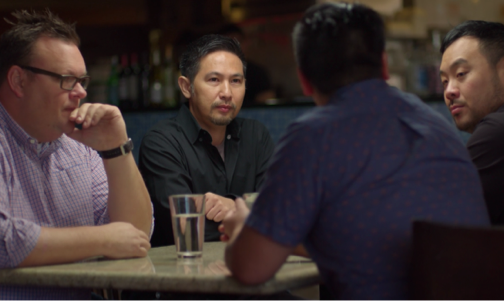 While it’s just as problematic when people from certain cultures are expected to be representative experts, the designation of ‘authority’ is nonetheless often accessible to and reserved for white chefs and writers who have immersed themselves in other cultures. Lorraine Cheun observes that out of New York Times’ 263 recipe entries listed as ‘Chinese’, 90% of the recipes have white people listed as the author. She also notes that immigrants who move to new countries and are forced to learn new ways of life aren’t valorized in the same way.
While it’s just as problematic when people from certain cultures are expected to be representative experts, the designation of ‘authority’ is nonetheless often accessible to and reserved for white chefs and writers who have immersed themselves in other cultures. Lorraine Cheun observes that out of New York Times’ 263 recipe entries listed as ‘Chinese’, 90% of the recipes have white people listed as the author. She also notes that immigrants who move to new countries and are forced to learn new ways of life aren’t valorized in the same way.
Further, because people of color are expected to be experts of their own culture, it’s unremarkable for them to have cultural expertise, or alternatively they are disallowed from demonstrating expertise on cultures outside of their own. (On the flip side, food entertainment also actively recruits immigrant biographies around trauma, memory, and place to create auras of cultural authenticity and specialization). For example, Edouardo Jordon (Salare and JuneBaby) talks about the importance of being recognized as a great chef, and not just as a great chef of color.
During Chang’s visits to China across different episodes (‘Shrimp and Crawfish‘, ‘BBQ‘, ‘Fried Rice‘), Fuchsia Dunlop serves as the episodes’ primary tour guide. Dunlop specializes in Chinese cuisine and is celebrated as a “world authority” on Chinese cooking.” She explains to Chang the different textural mouth feels of the seemingly bizarre Chinese food world to Chang, hoping to “convert” him to liking sea cucumbers, tendons from deer feet, and donkey.
In a scene at Ting Li Guan in Beijing, she tells him (and the viewer) to put aside prejudices and to just enjoy the “soft rubberiness” of tendons. When Chang doesn’t enjoy the food, she apologizes in Mandarin on his behalf to the waitstaff and tells him, “Texture foods are the last frontier…it took me years of eating Chinese food and politely eating all these slithery, rubbery, gristly things and not enjoying them…and now I really like them.” Chang then says he’s reminded of what it’s like to be new to a cuisine for the first time and to be a foreigner to something.
By positioning herself as the authority with mastery over Chinese food cultures, Dunlop ‘introduces’ and ‘familiarizes’ the Western subject to Chinese cuisine. As the connoisseur producing knowledge of Chinese cuisine, she mediates the meaning and exchange of value in Chinese food. I’m sure Dunlop is well-versed in Chinese food, but her role in the show as the person with “insider” knowledge about this exotic, other culture, and as well as her career specializing in Chinese food, evokes the theme of “Westerner as cultural connoisseur” and imperialist ideas about discovery.
Later, Ruth Reichl talks about her role in getting New Yorkers to take Chinese food seriously. While she points out the hierarchy of taste between the ‘cheap eats’ and serious eats column as one that’s geographically inflected, Reichl also becomes a mediating force of how Chinese can be valued. She reads her review of Great NY Noodletown in Chinatown to the viewer while the camera pans through the restaurant at the unnamed cooks and waitstaff at work — the waitstaff, unlike Reichl, a white woman, have no voice on the subject of Chinese and Chinese American cuisine.
The commodification of food can’t be separated from Orientalist fetishizations of the Other, since the transnational circulation of certain foods as desired cultural commodities rely on discourses of racial, ethnic, and cultural difference. Scholar Minoo Moallem calls this a “scopic economy”—where the politics of value are mediated by regimes of curiosity and visibility that enable the creation of transnational, commercial empires and networks.
Ugly Delicious’ lionizing of white cultural authorities is also evident in writer Peter Meehan’s inside look at regional BBQ in America only features white pitmasters.
In writing on the erasure of people of color in craft culture, Lauren M. Jackson describes barbecue’s history as being so “inescapably black that it has been impossible to completely whitewash that legacy.” Yet, Meehan’s tour of BBQ does exactly that. (In fact, there are no Black people at all featured in the barbecue episode.) Jackson discusses how the transformation of barbecue into craft has barred people and cultures “most instrumental to the development of barbecue” from participating in the genre at the highest levels.
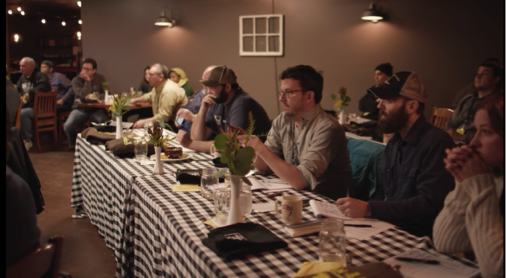 Meehan attends the Whole Hog Extravaganza, a pitmaster convention at 17th Street Barbecue in Murphysboro, IL which appears to be predominantly white in both presenters and attendees, reifying the image of barbecue being dominated by “white hipster males” with “exceptional taste and skill”.
Meehan attends the Whole Hog Extravaganza, a pitmaster convention at 17th Street Barbecue in Murphysboro, IL which appears to be predominantly white in both presenters and attendees, reifying the image of barbecue being dominated by “white hipster males” with “exceptional taste and skill”.
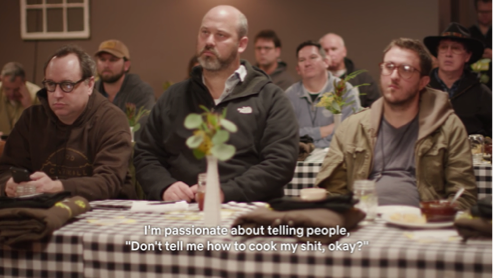 For example, Elliott Moss (Buxom Hall BBQ) talks about the high expense of doing barbecue with pasture-raised hogs because people in Asheville “really care where their food comes from.” What goes unmentioned is that the particular people he’s referencing primarily reflect a white, affluent demographic of Asheville.
For example, Elliott Moss (Buxom Hall BBQ) talks about the high expense of doing barbecue with pasture-raised hogs because people in Asheville “really care where their food comes from.” What goes unmentioned is that the particular people he’s referencing primarily reflect a white, affluent demographic of Asheville.
Given the show’s emphasis on the history of food cultures, it should not omit the history of barbecue in the U.S. as arising from enslaved men cooking large meals for public celebrations; nor should the show forget that barbecue restaurants played a big role in desegregation battles.
2. The Burden of Tackling the ‘Bigger Stuff’ – On Race, Class, Gentrification and ‘Respecting’ Other Cultures
In the episode ‘Fried Chicken‘, while eating hot chicken with Nick Bishop Jr. and Sean Brock (Husk) at Bishop’s restaurant Hattie B’s, Chang says, “You guys are white guys selling something that was based on something that was not of your culture.”
Both Bishop and Brock are white proprietors of ‘Black culture’ and both of their restaurants specifically cater to white and upper middle class communities.
Bishop replies, “We’re going to do it right and we’re going to be respectful of it. And I don’t think that the way that people may have 20 years ago, 100 years ago, 200 years ago, so I have to live for today and to try to be a good person.”
Chang goes on to ask, “As someone who is crushing your food, and loving your food…I don’t have that burden. How do you be respectful?” Here, Chang not only avoids any such conversation but also displaces any possible burden of self-responsibility by positioning himself as nothing more than a consumer at Hattie B’s (without engaging his own position as someone who also profits from selling things not of his culture).
Bishop answers, “I can’t tackle all of the bigger stuff by myself, I just know that as long as we’re good sort of tenants of it that’s the best we can do. I’ll always pay an homage to the [restaurant] Prince’s and being able to tell that story of Bolton’s and kinda the people that paved the way before we were ever even thought of.”
First, the concept of ‘respect’ remains slippery. The alleviation of white guilt by “being a good person” who is simply doing their best and has better political ideologies than their predecessors seems empty. It does little more than offer individual reassurance to Bishop while it elevates his business. Beyond an abstract gesture to ‘homage’ and ‘telling that story’, what is Bishop actually doing in a concrete way that ‘respects’ Boltons and Prince’s?
Media scholar Minh-Ha T. Pham writes that the explanatory frameworks of “cultural appropriation ” and “cultural appreciation” tend to reduce the problem of unauthorized copying to one of utility. The focus on individual use, intentions, and feelings obscures racial inequalities and blurs the structural dynamics of capital and power.
Pham uses the phrase “racial plagiarism” to describe copying of racial styles, forms, practices, and knowledges without permission and adequate attribution that produce “social and material enclosures”. She writes that by colluding with racial capitalist processes of value extraction where racialized groups’ cultures are exploited for the benefit of dominant groups, racial plagiarism “displaces the source community’s value system, authorial power, and evaluative authority within a racialized system of commodity capitalism.”
Pham argues that there are racial bifurcations around of who is seen as generators of creativity. The act of ‘copying’ other forms of cuisines by white chefs is rarely seen as an act of theft but rather that these chefs are creative subjects engaging in cultural and productive labor.
Chang continues the conversation by asking, “You’re adding value…what if you start killing the very thing that inspired this?”
Brock replies, “That’s the scary part. When we take it on as our obsession and passion, there’s a lot of stuff that comes along with that. And that’s a lot more complex than just cooking food.” Bishop adds: “…Stuff that on the front end you would have never thought about because you just wanted to make good food.”
Brock’s use of the word ‘complex’ serves to disengage from ‘a lot of stuff’ that comes with the cooking of food derived from another establishment’s creativity. (Read Rachel Martin’s piece on the legacy of Prince’s and history of Nashville’s racial politics through hot chicken here).
Further, the positioning of Brock and Bishop as ‘outsiders’ forecloses the possibility that they might intimately confront the legacies of racial violence that associate ‘fried chicken’ with Black culture. Earlier snippets of the episode include Chang’s interviews with Dr. Psyche Williams-Forson on the history of fried chicken as intertwined with the history of plantation slavery; as Black studies scholar Christina Sharpe asks, what then are Brock and Bishop’s relationship to this legacy? She says, “There’s an intimacy that you have as the perpetrator of violence, and an intimacy that you have as people who have suffered violence.”
The scene never fully addresses the question of what does it mean for two white men in the South to extract value and profit from a Black-owned business. Discussions with white chefs that end with the mandate to ‘respect’ other cultures belies the question of accountability and absolves chefs of actually dealing with how systems of racism and classism enable them to profit off of ‘other people’s food.
Later, Chang and Brock visit Dollye Graham-Matthews (Owner, Bolton’s) where Chang asks Dollye how she feels about other establishments selling hot chicken. She replies, “Everybody has something to offer…it cuts a little bit, but you shake it off.”
The scene shifts the burden of responsibility towards Dollye, placing an expectation upon her to accommodate other chefs by granting them her permission. Chang expresses both surprise and praise that she can keep “calm and cool and collected and loving.”
When discussing why Bolton’s has never marketed for a “whiter, more affluent audience,” Dollye shares that 1) not everyone can afford $4000 or $5000 rent; and 2) “[the patrons of Hattie B’s] wanted a place where they could feel comfortable and have beer and enjoy hot chicken.”
Part of Hattie B’s success has to do with the race and class politics of property location and access as well as the desire of white people to be ‘comfortable’ in an environment with other white people.
Another aspect of culinary ‘upscaling’ is when ‘second generation’ or ‘third generation’ chefs, contribute to the gentrification of places like San Francisco’s Chinatown when ‘uplifting’ their parents’ food. In the episode “Fried Rice,” Chang interviews Brandon Jew of Mister Jiu’s, which is sandwiched between two now-closed iconic San Francisco Chinatown Restaurants (Kan’s and Empress of China). Jew self-identifies as third-generation Chinese American who believes in “small, organic farms, seasonality—things that came from [his] training in California cuisine.”
This pedigree exemplifies food scholar Krishnendu Ray’s discussion of professionalism being refracted through prisms of “class, craft, and masculinity” where the ethnic cook is remade and promoted through proper skills, habits, and training to fit “middle-class aspiration and upper-class consumption.” However, Jew is also able to refashion his cultural background—such as making fried rice “how his mom use to make it”—into a form of expertise. Jew, like Chang, is styled as “ethnic haute” cuisine; both capitalize upon their “ethnic expertise” as culinary ambassadors of non-white cuisines for white audiences.
Jew demonstrates making his steak fried rice, inspired by his mom’s reuse of leftovers and by the Chinese American beef and broccoli dish, and he shares that his food is about speaking to Chinese Americans “that want to feel a sense of pride in Chinese food again.” The steak fried rice at Mister Jiu’s is $22.
Jew positions himself as a savior of Chinese food and this clip reinforces the idea that Chinese food has no value outside of haute cuisine. Jew’s comments suggest that there currently is no pride in Chinese food and that this can only be fixed by reinventing and elevating the cuisine for white and upper class palates. In interviews, Jew claims that he ‘pays homage’ to ‘tradition’, yet reinforces the idea that ‘traditional’ Chinese food is full of crappy, artificial, and cheap ingredients (which are racially loaded connotations).
While the episode itself focuses on the disparity in ways Chinese food is socially, economically, and culturally valued in comparison to other cuisines, largely due to anti-Asian sentiments, what happens when the Chinese food that people can feel pride in isn’t affordable by working class immigrant populations? Scholar Diane Wong’s work on gentrification in Chinatowns describes the problem as being a process of placing profit over people. What happens when Chinese food is valued only when it caters to a more elite class of Asian Americans and other clientele who can afford the uptick in price?
One of Chang’s goals in the show is finding out how food can serve as a bridge between communities—but food gentrification demonstrates a moment where food culture can further schism and divides within and across communities.
3. “Classic Fusion Food” — On Colonialism as Ingredient
In a conversation with Georgette Dang and Tommy Tran at Cajun Corner, Chang asks why Viet Cajun food wouldn’t work in New Orleans. He poses the question to the owners, “But how did Vietnamese food come to be? Someone merged together some French and some Southeast Asian food. Vietnamese food is probably the most classic fusion food and greatest success story of as a fusion food of the past 100 years.”
The problem with celebrating Vietnamese food as ‘classic fusion’ is that this framework erases the violence of French colonization and occupation of Vietnam. The bánh mi is often cited positively as a ‘delicious’ outcome of colonialism, as if tasty food justifies colonial violence.The French ‘introduction’ of the baguette to Vietnam is not just a gesture of cultural exchange but done as part of imperial systems of control and market expansion.
Searches for more articles on French colonialism and Vietnamese food, primarily bring up articles about how tasty and delicious French ‘influence on Vietnamese food is. (Filipino food has also often been celebrated as the “original fusion cuisine” that brings together Spanish, Chinese, Japanese and Pacific Islander “flavors”—while some of this has to do with commercial trade, the Philippines has been occupied by Spain, the U.S. and Japan.)
A glaring gap in the show’s discourse about food and culture is the absence of any engagement on how systems of imperialism and colonialism shape food.
In Episode 2, ‘Tacos’, the animated short on the ‘Brief History of the Taco’, the clip mentions that we have flour tortillas because the conquistadors “missed their bread” and “introduced wheat.” While the clip tells this story in a goofy, comical way, what must be reiterated is that food is used as a form of colonial control.
Food regimes are defined by empire, with imperial trade systems that circulate ‘exotic’ goods from colonized nations, and cheap labor, where poorer nations are used as agricultural sites to farm food for richer nations. Colonialism destroys ecological systems that create local dependencies on other ingredients and food items.
Near the end of the ‘Fried Chicken’ episode, David Simon (Treme, Wire) says, “I actually think that the American experience is actually an experience of cultural appropriation. It’s what we do best. We are the greatest mutts that history ever put together. And we drag everything through the collective and it comes out different. We wouldn’t have anything without it.”
The statement echoes the familiar frame of the U.S. as a multicultural melting pot: a glorious mix of different people and cultures. Here, the “greatest mutts that history put together” elides settler colonialism — the theft and current occupation of Native lands by the U.S. nation state — and glosses over the history of restrictive and racialized U.S. immigration laws that select and deselect immigrants, as well as this country’s legacy of chattel slavery.
As a show, Ugly Delicious aims to disrupt logics of authenticity by telling stories of how immigrants reshape food cultures (for example, with Asha Gomez’s fried chicken recipe, Viet-Cajun cuisine, tacos árabes in Puebla, Mexico) or how chefs in different geographic regions use local ingredients to remake food items (for example, pizza in Tokyo and Copenhagen). However, the shaping of foodways and the human costs of rapidly globalizing food cultures by systems of imperialism, as well as the global expansion of capitalism, and militarism; all of these topics must be part of this conversation.
4. Struggling for Acceptance — On Grateful Refugees, Model Minorities, and Bad Asians
Less discussed by critics and thinkpieces are the ways Ugly Delicious mediates Asian racialization.
In Episode 5 (‘Barbecue‘), Chang and Dave Choe go to Beijing. Chang brings up a conversation about Asian American representation in media: “People expect Asians as a whole to be subservient, right? Quiet.” Choe then says, “If you’re Asian and you’re on television, you have to either talk with an accent, know some form of martial arts, or you have to be homosexual.”
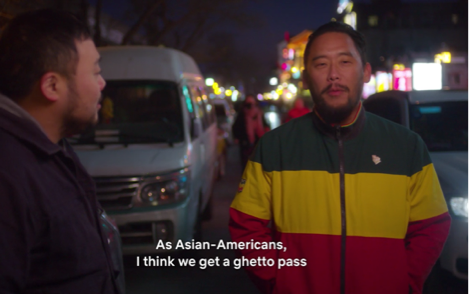
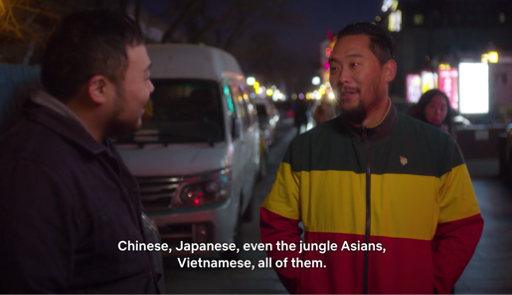 While there’s lots to be said about Asian American stereotypes in media, Choe isn’t doing Asian Americans any favors. The attempt to disrupt stereotypes of Asian passivity through loud, hypermasculine displays (see below) can be just as much of a problem.
While there’s lots to be said about Asian American stereotypes in media, Choe isn’t doing Asian Americans any favors. The attempt to disrupt stereotypes of Asian passivity through loud, hypermasculine displays (see below) can be just as much of a problem.
Choe then tells Chang, “As Asian Americans, I think we get a ghetto pass to make fun of all the Asians. Chinese, Japanese, even the jungle Asians, Vietnamese, all of them.” (The phrase ‘jungle Asians’ comes from Ali Wong’s Netflix special “Baby Cobra” where she ‘jokes’ about ‘jungle Asians’ versus ‘fancy’ Asians, all presented as a way to describe inter-Asian racism.) The reference itself speaks to real, material, and structural divisions within the Asian American community, particularly around class and migration.
Given that the show points out various forms of xenophobic racism targeting Asian communities in different ways, Choe’s reference to a ‘ghetto pass to make fun of all Asians’ is in poor taste.
In the episode ‘Shrimp and Crawfish’, Chang says that he wants to “struggle for acceptance.” After a clip on ways the KKK terrorized Vietnamese refugees, the show cuts to Chang having dinner with shrimper Johnny Tran. He asks him, “Are you guys accepting of people from countries in the Middle East…trying to come to America?”
Tran responds that he had a similar vetting process as a refugee and points to the ‘radicalization’ of Islam as reason for having a stringent and restrictive vetting process today. Chang asks Tran why he can’t be a more empathetic.
Tran then says, “Everyone who comes over is allowed the same thing we’re allowed. You have to prove yourself. You prove to us that you want to be here to work…It feels like half of America wants handouts and the other half works. We’re the other half that works.”
After the interview, Chang reveals that he’s sad because he didn’t hear the perfect answer and wasn’t sure how to tell someone to be “more open” but there were possibilities to do that through food.
While I too am frustrated with Tran’s answers (he reminds me of some of my relatives), the interview with Tran is interesting precisely because Tran’s ‘bad politics’ and ‘lack of empathy’ reveal a failure of assimilation into ‘good’, ‘liberal’ politics. Tran’s particular answer deflects from the multiple vectors of Islamophobia and consolidates the problem onto individual politics.
Further, Tran’s mention of being the “other half that works” demonstrates an internalization of the model minority myth, where the mythical ‘model minority’ figure functions as a form of human capital, governed by market values and embodying infinite capacities for self-development. The model minority myth disciplines other raced and classed subjects by constructing a binary of deserving and undeserving—the racially coded reference to the ‘half that wants handouts’ uplifts a narrative of meritocracy, where hard work alone equates success.
Later, Chang speaks to Al Le (chef/owner, Nam Giao), whose labor-intensive cuisine sparks Chang to ask: “You do more work than many French kitchens—I feel like your prices could be four times as much. Don’t you get upset about that?”
Le replies, “No, I want to bring Vietnamese food to the public. To say thanks to Americans, to say thanks to America who gave us an opportunity here.”
Chang tells Le he’s an “angel”, and Le goes on to share that “food is the bridge that makes the general public understand the Vietnamese better” and tells a story of how Vietnamese refugees gave egg rolls to their neighbors as a way to facilitate cultural understanding.
Chang seems more satisfied in this scene than with his interaction with Johnny Tran.
Yet, when framed this way, Le’s answer evokes what Mimi Thi Nguyen describes as “the gift of freedom”, which creates the position of the “grateful refugee” forever indebted to the nation-state. The reification of America as an exceptional site of opportunity bears rethinking in our current ‘America-first’ administration.
5. Having Sex with a White Girl on TV as a Historic Moment for Asian American Men? — On Reclaiming Asian Masculinity through Objectifying Women
While Chang jokingly questions his friendship with Dave Choe throughout the series, Choe’s repeated presence on the show amounts to a tacit endorses of his behaviors and comments. I bring up Choe again at the end here, because his inclusion in the show raises a lot of questions about Asian American media representation and visibility. Helen Rosner at the New Yorker applauds Choe’s antics saying that he “needs his own show”. Notably, Choe, along with chef Roy Choi (Kogi BBQ) has also been featured on Anthony Bourdain’s Parts Unknown, where they talk about being “bad Koreans” and Choe says, “Whatever you do, don’t date a Korean girl.”)
Also, in Episode 5 (‘BBQ‘), Chang eats Korean barbecue at Park’s Barbecue with Choe, actor Steve Yeun, and owner Jenee Kim. During the conversation, Chang wonders whether you could cook Korean barbecue like American barbecue to move away from the delineation of “barbecue-barbecue” vs Korean barbecue. When Yeun says that Chang has “opened and unlocked the door” for every person to watch how cultures (and specifically food cultures) shift and transform, Chang says to Yeun, “You had an even bigger impact than we did.”
Choe interjects, “He had sex on TV with a white girl.”
Yeun appears taken aback while saying, “It was very positive for Asian Americans, I agree.”
Choe then goes on to elaborate that when he heard a Korean guy was going to have sex with a white girl on The Walking Dead, he got his whole family together: “I got my mom, and we sat in front of the TV, and I was like, ‘I hope this guy does a good job.’ I need to see him fuck with passion, and you know vigor.”
This moment showcases the problematic ways in which masculinity is often defined through the sexual conquest of women (what Jenn Fang describes as “misogylinity”). This brand of masculinity also holds onto a racial hierarchy that places white women as the pinnacle of attractiveness. The seamless transition in this conversation between food and heteronormative masculinity is telling: Erica Maria Cheung’s work on Asian American chef culture discusses the performance of hypermasculinity in so-called ‘food frats’; this is a chef culture that Chang champions and which explains the parallel fascination between culinary and heterosexual male prowess. Choe’s expression of desire for Yeun to do a ‘good job’ specifically responds to the racial emasculation of Asian men in the U.S. cultural imagination, and his accolades assert for Yeun that Asian American masculinity can only be reclaimed and reasserted through reinforcing heterosexism and accessing (female) whiteness.
Choe’s comments reflect a subset of misogynistic Asian American men who attempt to ‘prove’ their own masculinity by advancing the ‘legends’ of their penises—they use misogyny to ‘correct’ the problem of Asian emasculation.
Given that one of the running jokes is Chang’s repeated apologies for Choe’s blunt statements and brash behavior, it is noteworthy that Chang offers no excuse for Choe when the latter offers hypermasculine bravado for Yeun. Instead, the episode cuts to the sex scene in question from Walking Dead involving Yeun’s character and his white female love interest. Chang adds, “That’s a historic moment for Asian men…it’s never been documented.” Choe then tells Steve, “You were the first, you’re like Rosa Parks. You’re like Jackie Robinson.”
The invocation of prominent Black figures exemplifies what Mark Tseng-Putterman calls “anti-Blackness as metaphor”, where Asian Americans use Black history and struggle as a shortcut to advance an Asian American agenda, particularly around frustrations with Asian American invisibility. Further, the comparison of Yeun ‘fucking a white girl with vigor’ on TV is deployed as a “historic moment” for Asian men as if on par with the legacy of an iconic figure of the Civil Rights Movement demonstrates the pervasive toxicity of responses too often associated with perceived Asian American emasculation.
Both this conversation and editorial choice to include this banter and the sex scene are significant, given Chang’s general assertion that the show’s goal is to seek ‘multiple truths’ and perspectives. Chang’s ham-fisted and disappointingly unnuanced mistreatment of the conversation around Asian American male sexuality leaves us with an overall feeling of ambivalence towards Chang, and begs the question of where he sees himself in relation to questions of power. In this short clip, meant as a humorous offshoot in the episode, Chang candidly reveals his thoughts around representations of Asian American masculinity (which nonetheless may be worth considering given the shallow and brief mentions of Aziz Ansari’s presence on the show after the report of sexual assault); that candor is revealing. In their guide to Ugly Delicious, Eater lists Ansari as a “problematic comedian/actor”; the same could be said of Choe who may have either confessed to rape on his podcast—or at least made up a story about rape. Either way, he too is a “problematic artist.”
* * *
If you’ve made it this far into this article, you’ve probably closely watched Ugly Delicious like I have.
In watching, I’ve paused it every few minutes to yell things at the television and to write this article. What I appreciate about Ugly Delicious is that the show makes it possible for us to have a conversation about food and culture from a starting place that includes discussions of racism. For me, the show has brought varying moments of frustration, discontent — but also pleasure.
It’s true that we don’t often get to hear stories about food, race, and culture in mainstream media, and even less often do we hear stories about Asian Americans, immigration and food. However, we shouldn’t let ourselves be seduced by representation and visibility alone. Instead, we must dig deeper into the specific politics of our media.
It isn’t enough for Asian Americans to be seen on-screen eating food and talking about identity. We should be willing to ask ourselves what exactly a documentary series like Ugly Delicious is really trying to say about race, gender, food, and Asian Americana.
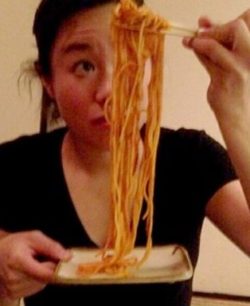
Rachel Kuo is a Ph.D. student studying media, culture and communication at New York University. She can be found on Twitter at @rachelkuo.
Learn more about Reappropriate’s guest contributor program and submit your own writing here.
